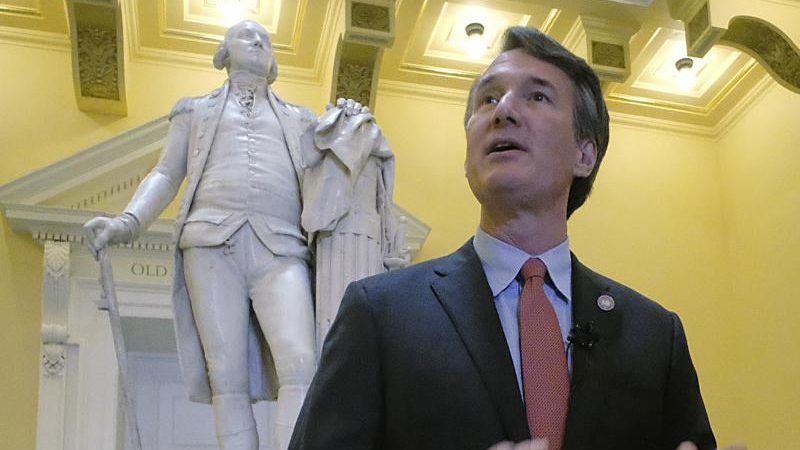
RICHMOND, Va. (AP) — The politically divided Virginia General Assembly worked through Gov. Glenn Youngkin’s scores of proposed amendments to legislation during a one-day session Wednesday, approving most of his suggestions on matters ranging from intoxicating hemp products to energy policy.
The legislature sustained the Republican governor’s three vetoes on a day marked by farewell speeches by some of this year’s many retiring legislators. The Senate also honored Abigail Zwerner, the Virginia first-grade teacher shot by one of her students in January, at a brief ceremony she attended with her family.
Of the 819 measures the General Assembly sent Youngkin during the regular session that ended in February, the governor signed 738 into law and proposed amendments to 78. Some of the changes lawmakers took up were small or technical; for other measures, Youngkin sought a more substantial rewrite.
In a statement, the governor praised lawmakers for working together to advance bipartisan “commonsense solutions on behalf of the 8.7 million Virginians who hired us.” But he criticized some of the amendments rejected by the Democrat-controlled Senate and pledged to work to advance those priorities.
Here is a further look at some of the day’s action:
INTOXICATING HEMP PRODUCTS
After lengthy and sometimes heated debate, both chambers ultimately agreed to Youngkin’s proposed adjustments to a bill that aims to ban the recreational sales of intoxicating hemp-derived products.
Youngkin made changes his office said were intended to ensure the continued availability of certain therapeutic CBD products while toughening the bill’s effort to clear store shelves of products containing intoxicants like delta-8 THC.
Hemp trade associations have warned that the bill could harm the industry. But supporters of the measure said it would bolster consumer safety, as the products — sometimes sold in packaging that mimics popular snacks — have sickened unsuspecting kids and adults.
“We will be doing a good deed for the citizens of the commonwealth today,” said Sen. Emmett Hanger, a sponsor of the legislation.
After both chambers sign off on the governor’s entire recommendation, the bill as amended becomes law. Most new legislation takes effect July 1.
INTIMIDATION OF JUDGES
Lawmakers rejected Youngkin’s proposed changes to a bill that would prohibit the state from publishing online the personal information of any active or retired judges or magistrates who request it be kept private. The governor asked for a provision that would make it a Class 1 misdemeanor for anyone who pickets close to the home of a judge, juror, witness, court officer or court employee in an attempt “to interfere with, obstruct or impede the administration of justice.”
Youngkin previously tried to enact a similar provision in response to last year’s protests outside the northern Virginia homes of some U.S. Supreme Court justices.
Democratic senators said the proposal would raise First Amendment concerns.
Bills with amendments rejected by the General Assembly go back to the governor, who can either veto or approve the legislation as it passed.
CHILD WELFARE
The Senate declined Youngkin’s request for amendments to a bill that would require pornography websites to strictly verify that users are 18 or older before giving them access.
The bill sponsored by Republican Sen. Bill Stanley was approved with strong bipartisan support. Youngkin’s amendments would have expanded the bill to require parental approval for children to set up accounts on websites that process or sell data, including social media sites such as Twitter, Facebook and Instagram.
The governor’s amendments also would have extended privacy protections under the Consumer Data Protection Act from the current protections given to children under 13 to all children under 18.
Democrats argued that the governor’s changes were vague or overly broad, or that they needed more consideration.
Youngkin said in a statement that he was “shocked by the Virginia Democrats’ decision to put politics before the safety of Virginians, especially our youth, online, at home, and at work.”
BUDGET DEALINGS
Both chambers signed off on Youngkin’s proposed amendments to what lawmakers have called a “skinny” budget — a sliver of a spending plan that addresses just a handful of allocations. Lawmakers opted to pass it on the last day of their regular session after failing to reach agreement on the entire state budget.
Republican Del. Barry Knight, chair of the House Appropriations Committee, said budget negotiations on that larger spending plan are set to resume this week after a two-week pause due to concerns about how economic uncertainty could impact the state’s spending.
Knight said he and the co-chairs of the Senate Finance & Appropriations Committee — Sens. Janet Howell and George Barker — plan to meet later this week. Knight said the budget negotiators had been concerned about the recent bank failures and stock market volatility and wanted to examine the state’s unemployment and inflation numbers before resuming budget talks.
“We want to make sure that we don’t plug something in this budget that we can’t afford,” Knight said.
Barker didn’t immediately respond to a message seeking comment.
ENERGY POLICY
The General Assembly approved Youngkin’s mostly technical changes to a measure intended to strengthen regulatory oversight of Dominion Energy’s rates and profitability.
The Senate rejected without much discussion a Youngkin amendment to a bill dealing with Dominion’s massive offshore wind farm. The amendment would have ensured a competitive bid for contracts for the development of any second phase of the wind project in order to “increase ratepayers’ protection,” Youngkin’s office has previously said.
VETOES SUSTAINED
Democrats moved to challenge Youngkin’s vetoes but failed to reach the two-thirds threshold required.
The three bills Youngkin vetoed would have: allowed public utility and broadband service vehicles to be temporarily left on private property without the owner’s consent, required changes in state employee grievance procedures, and convened a work group to study the issue of vehicle noise.